May 9, 2009 - A news study by University of California - San Francisco (UCSF) researchers were the first to link attitudes about the tobacco industry to smoking attitudes and behavior among a national sample of young adults.
To determine attitudes, the researchers asked respondents how strongly they agreed or disagreed with three statements: Taking a stand against smoking is important to me; I want to be involved with efforts to get rid of cigarette smoking; and I would like to see cigarette companies go out of business. The UCSF study measured attitudes of 1,528 people in the 18-25 age range (the age group with the highest smoking rate among any in the United States) through questions covering attitudes toward the tobacco industry, support of action against the industry, social groups, receptivity to advertising, depression, alcohol use, and other factors associated with smoking.
It was found that those respondents who agreed with those statements and supported action against the tobacco industry were one-third as likely to be smokers as those who did not support action against the tobacco industry. Among current smokers, those who had a negative attitude towards the tobacco industry were over four times more likely to plan to quit smoking than smokers who did not support action against the tobacco industry.
PAPER: Young Adult Smoking Behavior: A National Survey, Pamela M. Ling, MD, MPH, Torsten B. Neilands, PhDc, Stanton A. Glantz, PhD, Americal Journal of Preventive Medicine, Volume 36, Issue 5, Pages 389-394.e2 (May 2009), ABSTRACT..
Reference: Attitudes Toward Tobacco Industry Linked To Smoking Behavior, Science Daily, 5/6/2009.
Read more...
Bringing the World of Tobacco Control closer together..
In Process - Anti-tobacco industry ads successful in preventing and promoting cessation..
In Process - Household passive smoking and risk of ischemic heart disease..
May 8, 2009 - A study was conducted to investigate the relation between household passive smoking exposure and risk of ischemic heart disease (IHD) among female never-smoke patients by a retrospective case-control analysis. The data collected data suggested an increased risk of ischemic heart disease (IHD) from passive household smoking in female never-smoke subjects, and demonstrated a dose-response association.PAPER: Effect of Passive Household Smoking Exposure on the Risk of Ischemic Heart Disease in Never-Smoke Female Patients in Hong Kong, Ding Ding Jeffrey Wing-Hong Fung, Qing Zhang, Gabriel Wai-Kwok Yip Chi-Kin Chan and Cheuk-Man Yu (The Chinese University of Hong Kong), Tobacco Control - Published Online First: 7 May 2009, ABSTRACT....
Reference: Effect of Passive Household Smoking Exposure on the Risk of Ischemic Heart Disease in Never-Smoke Female Patients in Hong Kong, Tobacco Control, May 2009.
Read more...
Mississippi will have a 50-cent increase in tax on cigarettes..
 May 8, 2009 - Mississippi's Legislature has approved the first cigarette tax hike in two decades, voting to raise the tax by 50 cents a pack in a bid to reap millions of dollars in new budget revenues amid the nation's economic slump. Gov. Haley Barbour, a former tobacco lobbyist who has had a change of heart, said Wednesday, May 6th he would sign the tax increase into law. (The tax will be raised from 18-cents, the third lowest in the nation (has been in place since 1985) will be raised to 68-cents. Even at 68-cents, the tax is about half the national average of $1.23 per pack.)
May 8, 2009 - Mississippi's Legislature has approved the first cigarette tax hike in two decades, voting to raise the tax by 50 cents a pack in a bid to reap millions of dollars in new budget revenues amid the nation's economic slump. Gov. Haley Barbour, a former tobacco lobbyist who has had a change of heart, said Wednesday, May 6th he would sign the tax increase into law. (The tax will be raised from 18-cents, the third lowest in the nation (has been in place since 1985) will be raised to 68-cents. Even at 68-cents, the tax is about half the national average of $1.23 per pack.)
In 2008 the Mississippi state health ranking was 49th; it was 50th in 2007.
Reference: Barbour to Sign Cigarette Tax Increase, Jackson FRee Press, 5/7/2009; Mississippi lawmakers approve cigarette tax hike by SHELIA BYRD, Associated Press, 5/7/2009.
Related news briefs: Mississippi governor wants more tobacco taxes considered..; Mississippi - tobacco tax likely to be approved May 6, 2009..; Mississippi - still chance for tobacco tax increase for July 1, 2009 budget..; Besides federal tax increase - several states want to do the same..; Mississippi - with federal stimulus package passed cigarette tax loses momentum..; Mississippi - tobacco tax increase may pass this time..; U.S. States Considering Tobacco Tax Increase...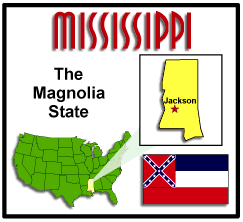
Read more...
England, House of Lords votes to ban shop tobacco dislays and restrict vending machine use..
 May 8, 2009 - The House of Lords has voted to ban displays of cigarettes and other tobacco products following a lively debate on the Health Bill on Wednesday (May 6th).
May 8, 2009 - The House of Lords has voted to ban displays of cigarettes and other tobacco products following a lively debate on the Health Bill on Wednesday (May 6th).
Cancer Research UK carried out key research which it provided to the lords on the issues involved, and was actively involved in sending out briefings and liaising with key opinion leaders.
The prohibition will be implemented in supermarkets in 2011 and small shops in 2013. It is understood that ministers decided on not implementing the ban instantly because of a desire to ease the impact of the move on small business during the recession.
Among the issues discussed by Peers were Conservative proposals to remove the key clause on putting tobacco out of sight, crossbench proposals to completely ban tobacco vending machines and a crossbench/Lib Dem sponsored amendment giving ministers the power to introduce plain packaging for tobacco products.
The amendment to the tobacco display proposal was defeated by a margin of almost 2:1, meaning that the proposal will pass on to the Commons. Opponents argued that a display ban would harm corner shops, but the amendment was voted down by 204 to 110.
However, the amendment to outlaw cigarette vending machines was unexpectedly voted down by Peers, meaning that the original proposal - to fit vending machines with age-restriction mechanisms - will stand.
Baroness Thornton told the House: "We are satisfied that there are benefits to removing displays: it will remove the promotion of smoking to children and support those people who want to quit. We are convinced that removal is the right and responsible decision." She also said: "I finish by commending the work of organisations such as Cancer Research UK, ASH and the British Medical Association, which have worked hard to provide us with the evidence we need to tackle smoking.
"Removing tobacco displays is another important step towards a tobacco-free world, one where children are protected and people who want to quit are supported to do so."
Cancer Research UK has also been campaigning for a complete ban on vending machines and hopes to influence the legislation when it reaches the House of Commons after the Lords failed to vote through an amendment to the existing proposal.
Suggested amendments on plain packaging and the tobacco industry's interference in policy making were debated but not put to a vote.
Richard Davidson, Cancer Research UK's director of policy and public affairs, welcomed the outcome of the Lords' vote on shop displays of tobacco. "Protecting children and young people from tobacco marketing is key to helping stop another generation becoming addicted to a product that kills half of all long-term users," he said. "Putting tobacco out of sight will help to put tobacco out of mind, and this will help towards the goal of a smokefree future. "We now urge the House of Commons to show the same commitment to health that the Lords have."
The Bill will now return to the House of Commons for a final vote by MPs.
Reference: Lords vote to ban shop tobacco displays and restrict vending machine use, CancerReseasrchUK.org, 6/8/2009.
Related news briefs: UK - Strategies to be implemented to prevent underage tobacco use..; England, Wales to ban tobacco displays in shops..; British Considering Ban on Cigarette Displays...
Read more...
Imperial Canada - stop illegal tobacco sales rather than raisng tax on tobacco..
 May 8, 2009 - Imperial Tobacco Canada, the wholly-owned indirect subsidiary of British American Tobacco p.l.c. (BAT) is Canada's leading tobacco company. Imperial continues to try and convince the Canadian governments to clamp down on illegal (illicit, contraband, smuggling) cigarette sales and NOT increase taxes on tobacco products.
May 8, 2009 - Imperial Tobacco Canada, the wholly-owned indirect subsidiary of British American Tobacco p.l.c. (BAT) is Canada's leading tobacco company. Imperial continues to try and convince the Canadian governments to clamp down on illegal (illicit, contraband, smuggling) cigarette sales and NOT increase taxes on tobacco products.
In a statement before the Ontario Legislature's Standing Committee on Justice Policy, Donald McCarty, Imperial Tobacco Canada's Vice-President of Law, called on the Government of Ontario to step up and stamp out the out-of-control illegal tobacco industry rather than waste time and taxpayers money on futile legislation.
Ontarians need to understand that the province has the highest percentage of illegal tobacco sales in Canada. In 2008, almost 50 per cent of cigarettes purchased in Ontario were illegal. The Ontario Auditor General reported late last year that in 2006-2007 the province missed out on $500 million in taxes specifically from illegal tobacco sales - no small sum in today's economic environment. Imperial Tobacco Canada believes it could be as much as $1 billion today.
By increasing the price for cigarettes via taxation legislators announce to the world that there are profits to be made in the illicit delivery of cigarettes.
More on tobacco in Canada.
Reference: Tobacco legislation deflects focus on true problem Imperial Tobacco Canada calls on Government of Ontario to address crisis of illegal tobacco sales, CNW Group, 5/7/2009.
Related news brief: Canada - will higher tobacco prices lead to increase in illicit cigarettes..; Imperial Tobacco Canada - slow illegal cigarettes/sue tobacco companies..
Click on image to enlarge.., flow of illicit cigarettes from the U.S.
Read more...
Wisconsin may be the 26th state to ban smoking in all bars and restaurants..
 May 7, 2009 - Smoking would be prohibited in restaurants, taverns and virtually all workplaces in Wisconsin starting in July 2010, under a compromise announced Wednesday by state lawmakers. The measure is likely to pass both houses and be signed into law by Governor Jim Doyle.
May 7, 2009 - Smoking would be prohibited in restaurants, taverns and virtually all workplaces in Wisconsin starting in July 2010, under a compromise announced Wednesday by state lawmakers. The measure is likely to pass both houses and be signed into law by Governor Jim Doyle.
The announcement came after lawmakers brokered a compromise between advocates for a strict ban and the Tavern League, a powerful lobbying group that has opposed a statewide ban in the past. Bill supporters agreed to delay implementation until July 5, 2010, so that bars would have time to prepare for the change. They also agreed to exempt the handful of existing cigar bars and all tobacco retail shops. In addition, the ban would not apply to Wisconsin casinos because the Native American tribes that run them are sovereign nations.
Virtually all other workplaces, including bowling alleys, factories and restaurants, would be required to go smoke-free. Hotels also would not be allowed to have any rooms with smoking allowed. Restaurant and bar owners still could set up smoking areas outside their businesses.
Julie Willems Van Dijk, Marathon County's health officer: "An individual has a right to smoke but an individual does not have a right to smoke in a place that puts other people's health at risk." Attorney General's 700 page report helped justify that second-hand smoke kills to prove it.
Three of Wisconsin's neighboring states — Iowa, Illinois and Minnesota — already have approved smoking bans.
Reference: Statewide smoking ban terms brokered by lawmakers
Bill would take effect in July 2010, not impact casinos, by RYAN J. FOLEY,  , May 7, 2009; Statewide Smoking Ban Likely, Not Everyone on Board by Liz Hayes, wsaw.com, 5/7/2009.
, May 7, 2009; Statewide Smoking Ban Likely, Not Everyone on Board by Liz Hayes, wsaw.com, 5/7/2009.
Wisconsin related news briefs: Wisconsin - Increased Sales Tax Decrease in Smoking..; Wisconsin's achieves the lowest adult smoking prevalence ever..; The primary reason to increase the tax on tobacco is to get smokers to quit and dissuade kids from starting..; Wisconsin cigarette tax and tax on other tobacco products to increase January 1, 2008..;Wisconsin to Increase Tax on All Tobacco Products..; Wisconsin voters overwhelmingly (2-to-1) favor upping cigarette taxes by $1.25 a pack..
Click on image to enlarge..
Read more...
PMI - 2009 Annual Meeting of Stockholders, May 5, 2009..
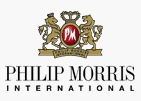
May 7, 2009 - Philip Morris International Inc. (PMI) held its 2009 Annual Meeting of Stockholders today. Remarks of Louis C. Camilleri, Chairman and Chief Executive Officer, highlighted the company's key achievements in 2008 and reaffirmed the company's commitment to deliver returns to its shareholders.
The highlight of 2008 was clearly our spin-off from Altria Group, Inc. in March." Our track record is excellent. Over the last ten years, we have increased our volume at a compound annual growth rate of 2.0% and our operating companies income (OCI) at a compound annual growth rate of 7.6%," said Mr. Camilleri.
In 2008, PMI’s cigarette volume reached 869.8 billion units, an increase of 21.1 billion, or 2.5%, compared to 2007. During the first quarter of this year, our cigarette shipment volume was stable at 203.4 billion units, but was 1.1% lower excluding acquisitions. PMI emphasized its 2008 profit: $16.3 billion on the sale of 850 billion cigarettes outside the United States.
Our confidence in the future is based on the successful implementation of the strategies that we outlined at the time of the spin-off and, in particular, on the successful acceleration of innovation across our key brands and the roll-out of a new brand architecture for Marlboro. Our innovation efforts are focused on four key consumer trends. These are a greater preference for lighter-tasting, smoother cigarettes; an increased consumer interest in innovation and new products; a growing preference for slimmer diameter products amongst both male and female adult smokers; and an increase in demand in certain markets, most notably in Asia, for menthol cigarettes.
Let me share with you a couple of examples of our success with the launch of new products, focusing on Marlboro. Marlboro Filter Plus, also sold as Marlboro Flavor Plus, has a unique multi-chambered filter, one of which contains tobacco for added flavor and is sold in a novel sliding pack.
Marlboro Black Menthol was launched last August in Japan, where it has become our most successful new launch ever in this important market. It has achieved a 1.0% share of market and has enabled the Marlboro brand family to resume its growth, reaching a 10.4% market share in the first quarter of this year. Given the success of Marlboro Black Menthol in Japan, it was launched during the first quarter in Hong Kong and Indonesia.
Marlboro remains by far the best selling international cigarette brand in the world, but we have also successfully developed a broad portfolio of other brands across all price categories. Parliament is a prestige brand noted for its recessed filter. Its volume grew by 5.9% in the first quarter of this year. The brand generates superior margins and is particularly successful in Korea, Russia, Turkey and Ukraine. In Russia in fact, Parliament outsells Marlboro by some 25%. L&M is one of the world’s leading mid-price brands. Although L&M’s volume declined by 0.5% in the first quarter of this year, this was a relatively solid performance attributable mainly to the European Union Region, where it is the second largest cigarette brand, and most notably Germany, where L&M is the fastest growing brand on the market. Chesterfield is a mid-price brand that generally sells at a premium to L&M and therefore generates higher margins. During the first quarter of this year, the brand’s strong performance in the EU Region, where volume was up 5.5% most notably due to its strength in Austria, France and Portugal, was partially offset by a decline in Russia.
While we have actively supported ratification, and many of the provisions, of the World Health Organization’s Framework Convention on Tobacco Control, we do not support each and every proposal made by the FCTC’s Conference of the Parties or by all public health groups. We believe that tobacco companies should be permitted to communicate directly with adult smokers within well-defined – and enforced – rules. The ability to communicate with adult smokers about our brands is fundamental to the ability to communicate with adult smokers about our brands is fundamental to fair and vigorous competition which is why we do not agree to unilaterally stop all advertising, marketing or promotions. However, we will continue to press for effective legislation restricting tobacco marketing, including bans on television, radio, cinema, and billboards, provided that the rules apply to, and are enforced against, all tobacco products and all industry participants.
Similarly, we do not support unreasonable product standards that are intended to prevent the manufacture of products that adult smokers prefer. Nor do we support the growing call for product display bans and plain packaging. The imposition of point-of-sale display bans and generic packaging are inappropriate measures – fraught with legal and anti-competitive problems – with no evidence whatsoever to support the claim that either action would lead to a reduction in smoking prevalence among youth or adults.
We have an outstanding brand portfolio, led by Marlboro and Parliament, which is the leader in the above premium price category, and a wide range of mid and low-price brands, led by L&M, Chesterfield and Bond Street.
Around the globe, more than 75,000 people, representing over 100 nationalities, work for Philip Morris International. In 2005, we were delighted to welcome into our family the employees of PT HM Sampoerna. Today, this PMI affiliate in Indonesia employs approximately 30,000 people directly, and contracts with third-party operators who collectively employ more than 60,000 people.
References: Philip Morris International Inc. (PMI) Holds 2009 Annual Meeting of Stockholders, Reuters, 5/5/2009; Philip Morris Meeting Mixes Tobacco Profit and Protests by DUFF WILSON, The New York Times, 5/5/2009.
Related news briefs: Business Week - Philip Morris International's Global Race..; Many related news briefs - do a random search..
Read more...
Philip Morris USA sues over counterfeit Marlboros..
 May 7, 2009 - Philip Morris USA (PM USA), the nation's largest tobacco company and an operating company of Altria Group Inc., is accusing a New York retailer of selling counterfeit cigarettes and illegally using the company's Marlboro trademark. The federal suit filed in U.S. District Court in New York on Wednesday, May 6th against Mastic, N.Y. - based Tammy's Smoke Shop.
May 7, 2009 - Philip Morris USA (PM USA), the nation's largest tobacco company and an operating company of Altria Group Inc., is accusing a New York retailer of selling counterfeit cigarettes and illegally using the company's Marlboro trademark. The federal suit filed in U.S. District Court in New York on Wednesday, May 6th against Mastic, N.Y. - based Tammy's Smoke Shop.
The suit follows a seizure of 184 cartons of counterfeit cigarettes Tuesday, May 5th by Suffolk County police, the company said. Consumers had called Philip Morris with complaints about the cigarettes purchased from the shop and the company had agents buy cartons of the counterfeit product. "The sale of counterfeit cigarettes undermines the value of Philip Morris USA's brands and the legitimate channels through which our products are distributed and sold," Joe Murillo, vice president and associate general counsel for Altria Client Services, said in a news release.
A phone message seeking comment from Tammy's Smoke Shop was not immediately returned.
Over the last few years, the federal government and many state governments have increased taxes on cigarettes, giving rise to counterfeit or black market cigarettes.
Philip Morris is asking the court to ban the company from purchasing, distributing or selling counterfeit Marlboro cigarettes. It also is asking for the company to turn over its profits from the illegal cigarettes, along with punitive damages and attorney's fees. The company said it has taken recent actions to protect its trademarks.
Since 2002, Philip Morris has filed lawsuits in New York alone against the owners and/or operators of 71 Internet sites, 21 defendants involved in illegally importing cigarettes and 139 retailers selling counterfeit cigarettes.
Reference: Philip Morris USA sues over counterfeit Marlboros by MICHAEL FELBERBAUM, AP Business Writer,  , 5/6/2007.
, 5/6/2007.
Related news brief: Made-in-China Marlboros - a major mistake by Philip Morris International...
Read more...
Israel - first menthol-cigarette lawsuit in the world filed in Israel...
 May 7, 2009 - What is being described as the world's first class action lawsuit on behalf of people who developed lung cancer from smoking menthol cigarettes has been initiated by Israel's leading anti-tobacco attorney, Amos Hausner, The Jerusalem Post has learned. According to the lawsuit, Israeli law forbids adding any foreign ingredient to cigarettes. The fact that menthol is added without the product's label informing customers that it makes them more addictive is an additional violation, the lawsuit contends. The suit further argued that Dubek was guilty of "misleading consumers" by not warning that menthol additives make their products more addictive. Consumer protection laws require a manufacturer not to mislead the public, not only by action but also by omission.
May 7, 2009 - What is being described as the world's first class action lawsuit on behalf of people who developed lung cancer from smoking menthol cigarettes has been initiated by Israel's leading anti-tobacco attorney, Amos Hausner, The Jerusalem Post has learned. According to the lawsuit, Israeli law forbids adding any foreign ingredient to cigarettes. The fact that menthol is added without the product's label informing customers that it makes them more addictive is an additional violation, the lawsuit contends. The suit further argued that Dubek was guilty of "misleading consumers" by not warning that menthol additives make their products more addictive. Consumer protection laws require a manufacturer not to mislead the public, not only by action but also by omission.
Hausner is representing the family of a Rehovot mother of four who died of a tumor at age 47 after many years of smoking Dubek's Montana brand of cigarettes. He is also acting on behalf of an estimated 3,000 other menthol-cigarette smokers who developed cancer here during the past seven years. The statute of limitations on a manufacturer's responsibility for damage caused by its products runs out after seven years.
The Jerusalem lawyer is asking the Central District Court to recognize the case as a class action suit against Dubek - Israel's largest tobacco manufacturer - for NIS 3 billion. It will probably be several months before the court gives its response.
Research conducted by tobacco companies a decade or more ago to identify additives that increase tobacco addiction showed that menthol did the trick, and the companies made a special effort to market cigarettes with this additive. Menthol not only gives smokers a "more pleasant" feeling in their mouths and throats, but also keeps tobacco smoke - with its many toxins - inside the lungs longer, making it even more dangerous. The facts of increased toxicity have been confirmed by Prof. Ben-Ami Sela, director of the pathological chemistry institute at Sheba Medical Center in Tel Hashomer. Foreign research has shown that African Americans become even more addicted to menthol cigarettes than whites do.
Reference: Class action suit filed over menthol cigarettes by JUDY SIEGEL-ITZKOVICH, The Jerusalem Post, 5/7/2009.
Related news brief: Cigarette Makers Face Thousands of New Florida Lawsuits..; U.S. - Bill for FDA to regulate tobacco BAN MENTHOL..; Relationship Between the Symptoms of Respiratory Distress and the Pharmacologic Actions of Menthol.
Click on image to enlarge..
Read more...
Mississippi governor wants more tobacco taxes considered..
 May 7, 2009 - JACKSON, Miss. - Gov. Haley Barbour, a former tobacco lobbyist, who has long opposed an increase in tobacco taxes, is asking lawmakers to pass a $90 million hospital tax and consider other ways to generate revenue from tobacco companies. Barbour says if lawmakers ignore his proposals, agencies' budgets could be cut significantly next year even with Mississippi's share of stimulus money. Barbour spoke to lawmakers Wednesday, May 6th before they were to reconvene to handle budget bills.
May 7, 2009 - JACKSON, Miss. - Gov. Haley Barbour, a former tobacco lobbyist, who has long opposed an increase in tobacco taxes, is asking lawmakers to pass a $90 million hospital tax and consider other ways to generate revenue from tobacco companies. Barbour says if lawmakers ignore his proposals, agencies' budgets could be cut significantly next year even with Mississippi's share of stimulus money. Barbour spoke to lawmakers Wednesday, May 6th before they were to reconvene to handle budget bills.
Barbour says he won't veto a proposal to increase the cigarette excise tax from 18 cents to 68 cents a pack. But he says lawmakers should also change the way smokeless tobacco is taxed and put a larger tax on cigarettes made by companies that don't pay into the lawsuit settlement Mississippi reached with major tobacco companies in the 1990s - Master Settlement Agreement (MSA).
Reference: Miss. governor wants more tobacco taxes considered,  , 5/6/2009.
, 5/6/2009.
Related news briefs: Mississippi - tobacco tax likely to be approved May 6, 2009..; Mississippi - still chance for tobacco tax increase for July 1, 2009 budget..; Besides federal tax increase - several states want to do the same..; Mississippi - with federal stimulus package passed cigarette tax loses momentum..; Mississippi - tobacco tax increase may pass this time..; U.S. States Considering Tobacco Tax Increase...
Read more...
North Carolina - smoking ban scaled back again..
 May 7, 2009 - The altered bill was recommended by a wide margin in the Senate Health Care Committee, where just a week ago a more restrictive bill was approved by a clearly divided panel. But the bill was sent back to the committee after Senate Democrats said there weren't enough votes to pass a measure that would have extended to all work sites as well. Democratic leaders prefer a broader smoking ban that would outlaw smoking in virtually all indoor workplaces, but it became clear in recent days that such a broad ban did not have enough votes to pass in the Senate.
May 7, 2009 - The altered bill was recommended by a wide margin in the Senate Health Care Committee, where just a week ago a more restrictive bill was approved by a clearly divided panel. But the bill was sent back to the committee after Senate Democrats said there weren't enough votes to pass a measure that would have extended to all work sites as well. Democratic leaders prefer a broader smoking ban that would outlaw smoking in virtually all indoor workplaces, but it became clear in recent days that such a broad ban did not have enough votes to pass in the Senate.
The Senate health committee revised the bill so that it now applies only to restaurants and bars. Other workplaces, such as office buildings, would no longer be covered by the ban. Under the measure approved by a vote of 17-4 in the committee, smoking in all restaurants and bars would be prohibited, with exemptions for cigar bars, country clubs and similar private clubs. Covered patio areas with two or fewer walls also would be exempt.
The revised version is the latest in a long series of iterations of the smoking bill, which was originally sponsored by Rep. Hugh Holliman, D-Davidson. Last month, the N.C. House passed a version of the bill that would ban smoking in restaurants and most indoor workplaces, but not in adult-only businesses such as bars. That version angered the state's restaurant owners, who complained that it would put restaurants and bars on an uneven playing field.
If the Senate passes a different version, it will be sent back to the House. The House could concur with the Senate, or a committee of legislators would be appointed to work out the differences between the two chambers' versions.
References: NC smoking ban narrowed in Senate committee by GARY D. ROBERTSON,  , 5/6/2009; Senate committee scales back smoking ban by James Romoser, Winston-Salem Journal Reporter/2009.
, 5/6/2009; Senate committee scales back smoking ban by James Romoser, Winston-Salem Journal Reporter/2009.
Related news briefs: North Carolina Senate Health Committee votes for stricter smoking ban..; North Carolina House poised to pass smoking ban..; North Carolina - ban on smoking in public places passes 1st test...
Read more...
India - pictorial warning on cigarettes and tobacco products will be implemented from May 31 - no doubts about it..
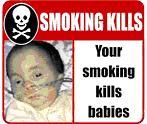 May 7, 2009 - The India Supreme Court today recorded the undertaking of the central government that the Cigarette and Other Tobacco Products (Packaging and Labelling) Rules, including the rules related to pictorial warning on cigarette and tobacco products, will be implemented from May 31,2009 and there will be no further extensions. The court further stated that in view of this promise, no court in the country shall pass any order inconsistent with this order.
May 7, 2009 - The India Supreme Court today recorded the undertaking of the central government that the Cigarette and Other Tobacco Products (Packaging and Labelling) Rules, including the rules related to pictorial warning on cigarette and tobacco products, will be implemented from May 31,2009 and there will be no further extensions. The court further stated that in view of this promise, no court in the country shall pass any order inconsistent with this order.
The rules under the Act were framed in 2006 but amended in 2007 to be implemented from December 1, 2007. However, implementation was postponed to March 31, 2008 and again to November 2008.
India has signed and ratified the World Health Organisation-Framework Convention on Tobacco Control (FCTC) which enlists key strategies for reduction in the demand and supply of tobacco products. Article 11 of the WHO-FCTC mandates that all countries that are parties to FCTC should display pictorial health warnings on tobacco product packs.
(The Government of India sometimes referred to as the Union Government, and also as Central Government.)
Reference: Supreme Court clears display of tobacco pictorial warnings, The Hindu, 5/7/2009; Cigarette packets to carry pictorial warning from May 31, Business Standard, 5/7/2009.
Related news brief: India - will pictorial or graphic health warnings be implemented from May 30, 2009...
Read more...
Senator Kennedy introduces legislation for FDA to regulate tobacco..
 May 6, 2009 - Tuesday night (May 5, 2009) Sen. Edward Kennedy introduced legislation similar to a bill already passed by the House that gives the federal government the power to regulate tobacco products.
May 6, 2009 - Tuesday night (May 5, 2009) Sen. Edward Kennedy introduced legislation similar to a bill already passed by the House that gives the federal government the power to regulate tobacco products.
Kennedy’s bill, Family Smoking Prevention and Tobacco Control Act, sets the stage for  Senate action on tobacco legislation this month or in June. The measure is expected to pass with bipartisan support. Kennedy, the chairman of the Senate Health, Education, Labor and Pensions Committee, has scheduled a panel hearing for next Tuesday to consider his bill.
Senate action on tobacco legislation this month or in June. The measure is expected to pass with bipartisan support. Kennedy, the chairman of the Senate Health, Education, Labor and Pensions Committee, has scheduled a panel hearing for next Tuesday to consider his bill.
The House last month overwhelmingly passed a bill, sponsored by Rep. Henry Waxman, D-Calif., giving the federal Food and Drug Administration authority over how tobacco products are made, advertised and sold.
President Barack Obama supports FDA regulation of tobacco.
If there are any differences between the Waxman and Kennedy bills, they would be worked out in a House-Senate conference committee.
Reference: Tobacco-regulation bill introduced in Senate by James R. Carroll, Louisville Courier-Journal, 5/6/2009.
Read more...
EU - restrict imports of tobacco unless member has minimum tax..
 May 6, 2009 - Finland and the other old member-states of the European Union (EU) want to restrict personal imports of tobacco products from members that refuse to raise the minimum tax on tobacco. In addition to Finland, the move is being supported by a number of other countries with high tobacco tax rates, such as Britain, Sweden, Austria, Germany and Ireland. Click - Old and New Members of the EU..
May 6, 2009 - Finland and the other old member-states of the European Union (EU) want to restrict personal imports of tobacco products from members that refuse to raise the minimum tax on tobacco. In addition to Finland, the move is being supported by a number of other countries with high tobacco tax rates, such as Britain, Sweden, Austria, Germany and Ireland. Click - Old and New Members of the EU..
The move would lead to the imposition of new limits on passenger imports just as the old ones are expiring.
However, the proposal is problematic for many new EU members, which have only recently achieved or are getting close to the previous minimum duty level. For instance, Latvia’s tax level recently reached the minimum level, and that of Estonia is also close. The new member-states agreed to increasing the minimum duty rate only if they were given a long transitional period in implementing it.
The old member states see the hike in the minimum tax as important, because they fear that their citizens will be bringing in more tobacco products from the Baltic region and Eastern Europe. Finland is blocking growth in imports from Estonia by imposing a limit on passenger imports on tobacco products in packages which do not have warning labels in Finnish or Swedish. Slightly under one fifth of all cigarettes smoked in Finland are bought abroad. There is great variation in the price of cigarettes in the 27 EU countries. A package of brand-name cigarettes costs one euro in Romania. The price is six times as high in Britain.
Related news briefs: EU - Cigarette tax at least €1.50 per pack from 2014..; EU wants higher tax on tobacco products..;
Bigger duty-free allowance for EU citizens accept cigarettes...
Reference: Finland wants to renew restrictions on passenger imports of tobacco from other EU countries Old and new member-states locked in dispute over minimum taxationHELSINGIN SANOMAT INTERNATIONAL EDITION - FOREIGN, 5/6/2009.
Read more...
Oregon - cigarette butt law passed in State House..
 May 6, 2009 - State Rep. Carolyn Tomei, D-Milwaukie, successfully urged her House colleagues Tuesday to approve a law (House Bill 2676) that bans cigarette butt littering. The bill passed, 34-25. If it passes the Senate, the law would subject violators to a $90 fine or up to 48 hours of community service — by picking up cigarette butts, if judges follow the advice of lawmakers who voiced their preference for how future violators would be treated under the law.
May 6, 2009 - State Rep. Carolyn Tomei, D-Milwaukie, successfully urged her House colleagues Tuesday to approve a law (House Bill 2676) that bans cigarette butt littering. The bill passed, 34-25. If it passes the Senate, the law would subject violators to a $90 fine or up to 48 hours of community service — by picking up cigarette butts, if judges follow the advice of lawmakers who voiced their preference for how future violators would be treated under the law.
Some opponents ridiculed the bill as a trivial pursuit in light of Oregon’s 12 percent unemployment and multibillion-dollar budget shortfall.
Tomei said Oregonians long ago reformed their litter-tossing ways, thanks both to a change in societal values and to anti-littering laws passed in the 1960s and ’70s. Oregon’s littering law needs the update, she contended, because it could be read to exclude cigarette butts. The bill was brought to the Legislature by a former state parks ranger, Deb Schallert.
Oregon would become the first state to pass a butt-specific littering law.
Related news brief: Will the Oregon cigarette butt law pass this year..
Reference: House oks law to ban cigarette butt littering The debate, however, brings up another — whether the bill is or isn’t trivial against the state’s harsh economic realities by David Steves, The Register-Guard, 5/6/2009.
Read more...
Maine - law banning flavored tobacco products - July 1, 2009..
 May 6, 2009 - Maine's law banning flavored tobacco products goes into effect July 1, 2009. On September 25, 2007 the State of Maine enacted two new laws to restrict the sale of candy- and fruit-flavored tobacco products to minors, and to ban tobacco from school premises at all times.
May 6, 2009 - Maine's law banning flavored tobacco products goes into effect July 1, 2009. On September 25, 2007 the State of Maine enacted two new laws to restrict the sale of candy- and fruit-flavored tobacco products to minors, and to ban tobacco from school premises at all times.
The ban of tobacco from school premises at all times went into effect immediately.
The flavored tobacco products ban prohibits the sale or distribution of such products beginning July 1, 2009.
We all hope that this ban succeeds and as a result, other states and countries around the world can enact similar legislation. STOP - the Proliferation of Flavored Tobacco Products..
We must stay on top of this issue. Legislators in Maine have already been fooled by friends of the tobacco industry when they changed existing legislation so a flavored tobacco lozenge could be sold in the state.
Click on image to enlarge; we must prevent these flavored tobacco products from gaining a foothold. We'll end of with kids becoming nicotine addicts at 9-years old or younger.
Read more...
Smoking rates decline in New York City..
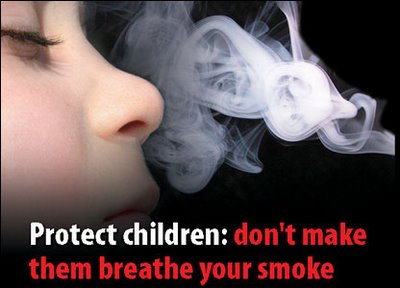 May 6, 2009 - The percentage of New Yorkers who smoke continues to decline. A new city survey indicates that 15.8 percent of adults in the city smoke, or around 1 million people. That's about 350,000 fewer people than in 2002, when the adult smoking rate was 21.5 percent.
May 6, 2009 - The percentage of New Yorkers who smoke continues to decline. A new city survey indicates that 15.8 percent of adults in the city smoke, or around 1 million people. That's about 350,000 fewer people than in 2002, when the adult smoking rate was 21.5 percent.
Health experts credit the decline to a number of factors, including higher cigarette taxes, bans on smoking in many public places, and greater awareness about the hazards of tobacco. The city is currently trying to help people quit by offering free enrollment in a nicotine patch and gum program. The patch giveaway ends this week.
Reference: Smoking rates decline in New York City,  , 5/5/2009.
, 5/5/2009.
Read more...
Croatia begins enforcing smoking ban on May 6, 2009..
 May 5, 2009 - Zagreb - Croatia begins enforcing a ban on smoking in most indoor areas Wednesday, May 6, 2009 threatening the estimated one-quarter of its population which lights up with stiff fines. Smokers caught in cafes, restaurants and bars face a fine of 1,000 kuna (180 dollars), while operators tolerating obstinate smokers may have to pay up to 15,000. The comprehensive ban sets in as a six-month transition period since the law on smoking was passed expires. Some areas, such as schools and hospitals, were declared smoke-free already last year. There is an exemption from the rule - Croatian law allows smoking in hospitals. Doctors explained that mentally ill smokers could become agitated without their nicotine fill. Croatian caterers worry the ban would hurt their business and point to Slovenia, where restaurant and bar owners reportedly recorded a 30-50 per cent decline since ostracizing smokers. An estimated 25-30 per cent of Croatia's 4.5 million people smoke
May 5, 2009 - Zagreb - Croatia begins enforcing a ban on smoking in most indoor areas Wednesday, May 6, 2009 threatening the estimated one-quarter of its population which lights up with stiff fines. Smokers caught in cafes, restaurants and bars face a fine of 1,000 kuna (180 dollars), while operators tolerating obstinate smokers may have to pay up to 15,000. The comprehensive ban sets in as a six-month transition period since the law on smoking was passed expires. Some areas, such as schools and hospitals, were declared smoke-free already last year. There is an exemption from the rule - Croatian law allows smoking in hospitals. Doctors explained that mentally ill smokers could become agitated without their nicotine fill. Croatian caterers worry the ban would hurt their business and point to Slovenia, where restaurant and bar owners reportedly recorded a 30-50 per cent decline since ostracizing smokers. An estimated 25-30 per cent of Croatia's 4.5 million people smoke
Reference: Croatia begins enforcing wide smoking ban by DPA, EarthTimes.org, 5/5/2009; Bar owners fear new anti smoking laws, Croatian Times, 5/5/2009; Smoking ban angers cafes, smokers in Croatia by Ivana Sekularac, Reuters.com, 5/6/2009.
Related news briefs: Croatia cigarette prices to go up April 1, 2009...; Croatia - ban in smoking in public places goes in effect.., Croatia - A ban on smoking went into effect on October 27, 2008.., Croatia Aims at More Stringent Anti-smoking Laws...
Read more...
Kenya - smoking ban must be enforced - it's the law..
 May 5, 2009 - Anti-tobacco campaigners want the Kenyan Government to protect the public from second hand smoke (ETS, environmental tobacco smoke, passive smoking, sidestream smoke, involuntary smoking) in all public places, including the streets.
May 5, 2009 - Anti-tobacco campaigners want the Kenyan Government to protect the public from second hand smoke (ETS, environmental tobacco smoke, passive smoking, sidestream smoke, involuntary smoking) in all public places, including the streets.
They have also challenged Parliament to enact the necessary amendments to the Tobacco Control Act 2007 to protect non-smokers from second hand smoke everywhere accessed by the public but not currently covered in the Act.
In a joint statement yesterday, the Institute for Legislative Affairs and the Kenya Tobacco Control Alliance protested against the recent notice by the Ministry of Local Government indicating that people can now smoke freely on the streets. "A notice by Ministry of Local government that smoking in the street is allowed is contrary to the spirit of the Act, which gives the right to a smoke free environment and the constitutional right to life," said ILA Executive Director Rachel Kitonyo.
She said the announcement was in bad faith and the organizations can only read the hand of the tobacco industry in it.
Prof Peter Odhiambo of Tobacco Control Alliance described second hand smoke as extremely dangerous to the health of non-smoking public and causes diseases in children.
More on tobacco in Kenya.. About 12 per cent of cigarettes consumed in Kenya are illicit, either having entered into the country irregularly or those manufactured locally but destined for export markets finding their way back into the Kenyan market.
Related news briefs: Kenya - BAT declines to support charities - tobacco control laws..; Kenya - discrepancies between local smoke-free regulations and Tobacco Control Act..; Smoking ban starts in Nairobi, the capital of Kenya..; British American Tobacco (BAT) - 100 years in Africa...
Reference: Declare all public places smoking free, Government told by John Oyuke, The Standard, 4/25/2009; Ministry extends ban on smoking to the streets by Jim Onyango, Business Daily - Africa, 5/5/2009.
Read more...
Jordan - restaurant owners want smoking ban postponed..
 May 5, 2009 - The Ministry of Health issued a circular banning smoking in shopping malls starting March 1,2009 while restaurants were given until June 2009 to abide by the law so they have enough time to study the implementation mechanisms.
May 5, 2009 - The Ministry of Health issued a circular banning smoking in shopping malls starting March 1,2009 while restaurants were given until June 2009 to abide by the law so they have enough time to study the implementation mechanisms.
The Jordan Restaurants Association (JRA) has called for postponing the implementation of the Public Health Law, which bans smoking in public places, until the end of the year, a JRA official said on Sunday, May 3rd. JRA Deputy President Essam Fakhreldin: “We cannot implement the law that soon. We need to move step by step to be able to ban smoking in restaurants, and I think it needs years, not months, to enforce the ban.” He noted that the sector has already been affected by the global financial crisis and the implementation of the law will add to its financial burdens.
“We still have not reached a settlement with cafés that serve argileh (also known as nargile, hubble-bubble, water pipe, hooka, hookah, shisha, goza, meassel, water pipe, sheesha),” Fakhreldin said, adding that the association will propose designating a non-smoking area in restaurants and hotels.
Meanwhile, Hiba Ayyoub, head of the Tobacco Control Department, said no fines have been issued to violators since March, when the ban came into effect in malls. “The idea behind enforcing the law is not to collect money from people, but to change behavior and protect non-smokers,” she told The Jordan Times, adding, however, that “we will soon start issuing fines for those violating the law. We announced the endorsement of the law last year and the enforcement started in March… I think everyone knows about it now and it is time to implement it.”
Ayyoub noted that the Health Ministry will soon sign an agreement with the environment police to help monitor adherence to the law. As for restaurants, she said they “have to implement the law, but we still work with them on a mechanism to enforce it”. The Health Ministry will also meet with the Lower House next month to discuss implementing the smoking ban in Parliament. Ayyoub pointed out that although the House is the legislative authority, the Public Health Law has not been implemented there yet.
The only public institution other than the Health Ministry that implemented the law is the Ministry of Public Works and Housing. “It announced that its buildings are non-smoking and designated smoking areas in accordance with the required standards,” Ayyoub said, adding that they will use the ministry as a model to be followed in other public places.
Related news brief: Jordan - law to ban smoking in public places - ENFORCEMENT...
Reference:
Restaurants demand postponement of smoking ban by Khetam Malkawi, The Jordan Times, 5/4/2009.
Read more...
China - smoke more to kick-start the economy..
 May 5, 2009 - In an effort to kick-start the Chinese economy, Communist Party officials are being asked to do their bit – by smoking. In Hubei province's Gongan County, the order has come down from above that local government staff must consume 23,000 cartons of locally made cigarettes every year, which translates into a lung-busting 400 cartons for most council departments, and 140 cartons for each school.
May 5, 2009 - In an effort to kick-start the Chinese economy, Communist Party officials are being asked to do their bit – by smoking. In Hubei province's Gongan County, the order has come down from above that local government staff must consume 23,000 cartons of locally made cigarettes every year, which translates into a lung-busting 400 cartons for most council departments, and 140 cartons for each school.
If the bureaucrats and civil servants fail to smoke the required amount, their department risks losing out on its full share of the smoking allowance of four million yuan (£392,000, 437,133EURO, 586,622US). Gongan County hopes to retrieve losses from cigarette income tax with the decree, said Chen Nianzu, of the council's cigarette market supervision team. "We are guiding people to help contribute to the local economy," he told The Hubei Daily. Under the measures, workers who do not puff local brands can be fined.
The patriotic smoking drive follows pressure on party officials in Hefei province earlier this year to buy flats to keep the property market afloat.
China has 350 million smokers and million people die of smoking-related diseases every year. The government has introduced no-smoking areas and child education campaigns to try to get people to give up the habit.
Reference: Have a smoke and help save the economy, China tells party officials b
Turkey - data on tobacco usage - Turkish Statistics Institution ..
 May 4, 2009 - Turkish Statistics Institution (TÜİK) research data evaluated included tobacco and the consumption of tobacco products, exposure to cigarette smoke, tendency to quit tobacco products and people’s awareness of smoking’s effects on health. The report is a part of a global adult tobacco consumption research project done by the World Health Organization and Centers for Disease Control and prevention in 14 countries, including Turkey.
May 4, 2009 - Turkish Statistics Institution (TÜİK) research data evaluated included tobacco and the consumption of tobacco products, exposure to cigarette smoke, tendency to quit tobacco products and people’s awareness of smoking’s effects on health. The report is a part of a global adult tobacco consumption research project done by the World Health Organization and Centers for Disease Control and prevention in 14 countries, including Turkey.
The data shows that both smokers and nonsmokers are aware of the dangers of smoking in terms of health. Among the smokers, 94.5 percent have noticed the warnings on cigarette packages in the previous 30 days. Some 31.3 percent of people over 15 in Turkey smoke either every day or every once in a while, also showed that 15.2 percent of women and 47.9 percent of men smoke.
Although the smoking rate is in general higher in urban areas, research findings indicate that men in rural areas smoke more than men living in cities if only by a small difference. The rate of smoking in urban areas is 33 percent and it is 27.2 percent for rural areas. The study showed 47.8 percent of men in urban areas smoke and 48.1 percent of men in rural areas smoke. The rate of smoking for women in cities is almost as twice as much for women in rural areas. The percent of women smokers in urban areas is 18.7 while the percentage is 7.2 for rural. The highest rate of smoking is among people between the ages of 25 to 34, with 40.3 percent smoking.
The amount of women who have never smoked is 74.8 percent in general, which rises to 85.2 for rural areas. The percent of women who smoke every day is 14.5 percent for cities and 5 percent for rural areas.
In this age group, 22.4 percent of women and 58 percent of men smoke. The smoking rate among young people from 15 to 24 years of age is pretty high at 25.4 percent.
When split in to rural and urban areas, the percentage of smoking men between 25 and 34 is 38.8 for cities and 41.9 for other places. Of 35- to 44-year-old men, 58.4 percent in Turkey in general smoke. In that age group, 62.2 percent of men in rural areas and 56.9 percent of men from urban areas smoke. The percentage of people over 65 who smoke is 10.3 percent. This rate drops to 2.4 percent for women and rises to 20.5 to men. The research indicates that 58.4 percent of men in the age group of 25 to 54 smoke.
Reference: ’Smoke like a Turk’not just an old sayingHurriyetDailyNews.com, 5/4/2009.
Related news briefs: Turkey - smoking ban in all bars, restaurants and coffeehouses starting July 19, 2009..; Smoking ban in Turkey lowers cigarette consumption..; Turkey's ban on pubic smoking goes into effect on Monday, May 19, 2008..; British American Tobacco (BAT) reported group volume sales up for first quarter 2008..; More on the quick fix for outdoor smokers..; BAT to Acquire Most of Denmark's ST..; More on Philip Morris International of the Future..; WHO Report on the Global Tobacco Epidemic 2008...
Read more...
Denmark - possible graphic warnings on cigarette packs..
 May 4, 2009 - The Health Minister, Jakob Axel Nielsen, favors graphic warnings (on tobacco products, cigarettes)and believes that they will be ‘implemented’ when the government launches its national prevention-based health plan after the summer vacation. Nielsen does not need the government’s backing to put the proposal into effect since his ministry has the authority to do that itself.
May 4, 2009 - The Health Minister, Jakob Axel Nielsen, favors graphic warnings (on tobacco products, cigarettes)and believes that they will be ‘implemented’ when the government launches its national prevention-based health plan after the summer vacation. Nielsen does not need the government’s backing to put the proposal into effect since his ministry has the authority to do that itself.
It's probably best for the health minister to wait for the results of the European Union (EU) - study aimed at developing better graphic images.. - TobaccoWatch.org.
Reference: Graphic warnings bound for Denmark, Tobacco Reporter, 5/1/2009.
Related news briefs: Scandinavian Tobacco changes name to British American Tobacco Latvia..; Bigger duty-free allowance for EU citizens accept cigarettes..; Denmark - Must Be 18 to Buy Ciagrettes..; EU extends review of British American Tobacco (BAT) and Skandinavisk Tobakskompagni (ST) tobacco deal..; BAT to Acquire Most of Denmark's ST..; France Introduces Nationwide Smoking Ban January 1, 2008..; Snus snub for Sweden at EU court...
Read more...
Indonesia 'cash cow' for Philip Morris International..
 May 4, 2009 - Of South-East Asia's 125 million cigarette smokers some 46 per cent are in Indonesia, the only country in the region that has no legislation banning cigarette advertisements, the South-East Asia Tobacco Control Alliance (SEATCA).
May 4, 2009 - Of South-East Asia's 125 million cigarette smokers some 46 per cent are in Indonesia, the only country in the region that has no legislation banning cigarette advertisements, the South-East Asia Tobacco Control Alliance (SEATCA). 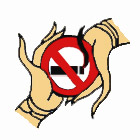
SEATCA said Indonesia has become a 'cash cow' for Philip Morris International (PMI), the owner of  Indonesia's PT HM Sampoerna Company which last year claimed 30 percent of the Indonesian market and an estimated revenue of 1 billion dollars. 'More profits for Philip Morris means more deaths for us in Asia,' SEATCA Senior Policy Advisor Mary Assunta said. The non-governmental organization (NGO) estimated that PMI spent 220 million dollar on marketing cigarettes in Indonesia in 2007. Over 90 per cent of Indonesia children have seen cigarette advertisements on television, according to SEATCA.
Indonesia's PT HM Sampoerna Company which last year claimed 30 percent of the Indonesian market and an estimated revenue of 1 billion dollars. 'More profits for Philip Morris means more deaths for us in Asia,' SEATCA Senior Policy Advisor Mary Assunta said. The non-governmental organization (NGO) estimated that PMI spent 220 million dollar on marketing cigarettes in Indonesia in 2007. Over 90 per cent of Indonesia children have seen cigarette advertisements on television, according to SEATCA.
Some 63 per cent of Indonesian men smoke, with an estimated 200,000 dying each year of smoking-related diseases, SEATCA claimed. SEATCA faulted Indonesia for having the weakest anti-smoking legislation in South-East Asia. Indonesia is the only country in South-East Asia except Cambodia that has no bans on cigarette advertising. Cambodia has at least drafted legislation to enforce an ad ban. Indonesia is also the only South-East Asian country that has not signed or ratified WHO Framework Convention on Tobacco Control.
The Indonesian government has argued that a cigarette advertisement ban might lead to more unemployment in the country.
More on tobacco in Indonesia..
Reference: The cigarette 'cash cow'Telstra BigPond News, 5/4/2009; Indonesia is "cash cow" for cigarette industry, says SEATCA, M&C, 5/4/2009.
Related news briefs: Tobacco industry has long targeted young people as "replacement smokers"; Indonesia - district court dismisses request to ratify FCTC..; Asean Countries - Tobacco Industry Blocking Global Treaty On Tobacco..; Indonesia - farmers hold rally protest tobacco controls..; Indonesia - tobacco farmers reject Islamic council's edict..; Indonesia - Ulema Council - debate results is split on smoking..; Indonesia - Withdraw Sponsorhip of Another Rock Concert..; Indonesia to increase tax on tobacco products..; Semarang, Indonesia - Cigarette Smoking Areas to be Prepared..; Jakarta, Indonesia - Malls help enforce non-smoking ban..; Indonesia - federal anti-smoking laws in one year - MAYBE..; Indonesia - NGO's (non-government organizations) Demand the Government Ratify WHO's FCTC.; Indonesia to raise cigarette tax by 6 to 7% in 2009..; Surabaya, Indonesia - anti-smoking bylaw 10/2009 - FOR REAL??; Indonesians smoking more than ever before..; Indonesia further rise in the excise tax would hurt the cigarette industry..; Alicia Keys - Jakarta Concert (July 31st) tobacco companies forced to withdraw sponsorship.. and Most Indonesians support moves to ban tobacco advertisements...
Read more...
SC tobacco tax increase - doubt exists maybe NOT this year..
 May 4, 2009 - Plans to raise the nation's lowest cigarette tax - 7 cents a pack and has not been increased since 1977 - to generate money for a new health insurance program are expected to move quickly through the senate.
May 4, 2009 - Plans to raise the nation's lowest cigarette tax - 7 cents a pack and has not been increased since 1977 - to generate money for a new health insurance program are expected to move quickly through the senate.
The 50 cent increase would generate $139 million for a new health insurance program for low income workers. It cleared the House with a 97-22 vote last month. Today (May 5, 2009) the bill is expected to be sent to the Senate floor for debate. Because the tax is the same and the concept similar to what the Senate approved last year, supporters doesn't expect delays,
But they're finding no fan with South Carolina Gov. Mark Sanford, whose veto of a 50-cent tax increase last year killed a similar bill.
Doubts exist because of Sanford's role, the fear of a veto and a planned May 21 adjournment. Senate Minority Leader John Land, D-Manning, "My prediction is nothing will pass this year."
Reference: SC cigarette tax hike bill expected to move fast Jim Davenport, Associated Press Writer, 5/4/2009.
Related news briefs: South Carolina - can we expect a tobacco tax increase this year??; South Carolina a magnet for cigarette black market..; South Carolina - legislators eager to pass cigarette tax increase - the odds are against them??; South Carolina to spend NO money on tobacco prevention..; South Carolina (SC) will NOT devote any resources to anti-smoking programs..; In 2008 will the politicians do what's right for the State of South Carolina??; South Carolina - Tobacco Tax Increase Killed - State House Fails to Override Governor's Veto.. and Tobacco Tax Increase – What’s Wrong with South Carolina??
Image, learn more about the South Carolina Tobacco Collaborative..
Read more...
C-store update, Pall Mall/Maverick, more SNUS images, etc...
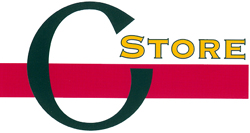
May 4, 2009
Click on image to enlarge..
Lorillard is complaining about the reduced price of R.J Reynolds (RJR) Pall Mall and Doral. They say with their contract Maverick with the c-store their discount product has to be within 30 cents of the lowest priced cigarettes. R.J. Reynolds has an Every Day Low Contract with the c-store that allows them to always have the lowest price. The owner corrected the problem by increasing the price of Pall Mall (the only other RJR investment (growth) product besides Camel) from $3.15 a pack. changed price to $3.59 then changed the price of Maverick to $3.89 within 30-cents of the lowest price cigarette.
RJR has promoted Pall Mall for the last couple of years by using what they call pulse promotion which means they promote it for a couple of months, and generate high levels of trial. It is claimed that Pall Mall has more puffs than a premium cigarette. So, it is longer lasting and it is high quality, and Pall Mall also has a premium heritage name and positioning. It is interesting to note in 1960 Pall Mall was the most popular cigarette in the U.S. because it was the first to introduce the 100mm cigarettes providing the smoker a few extra puffs. (Reynolds American Inc. Q1 2009 Earnings Call Transcript, Seeking Alpha, April 29, 2009..)
Have you noticed in c-stores RJR support brands (e.g., Winston, Doral, Kool, Salem) are not displayed - you only see their investment brands: Camel and Pall Mall. From the c-store news brief of February 14, 2009 - the R.J. Reynolds salesperson hides the shelf containing Kool cigarettes behind a sign advertising Pall Mall.

Marlboro B1G1F price raised from $5.29 ------> $6.99
PM promotion starting May 1st.. will give c-store owner a $1.00 off on Marlboro and then they want owner to reduce the retail price $1.00. RJR expects other tobacco companies to complain - if this happens the promotion will be canceled..

PM reducing price of Basic - people had been complaining - no longer considered price value/discount priced too high.. price to be reduced 15 cents from $4.55 to $4.35 a pack..
Camel SNUS pics..
insert (front and back) from STYLE Weekly - Richmond, Virginia, April 22, 2009..


Click on images to enlarge..
Maxim Magazine March 2009..
Back in December 2008 we reported that Philip Morris USA (PM) gave this one c-store a $100 per quarter if the owner devoted an entire shelf to Black & Mild Cigar Selections. This arrangement was fine with the PM salesperson but her supervisor has canceled the agreement because he felt the shelf was not at eye level making harder for the customers to see.
Click on image to enlarge..
In North Carolina there is a rule that a customer can only purchase five cartons of cigarettes at any time to reduce illegal cigarette sales. A newspaper ad for cigarettes (image below) - note that for all the other cartons it states limit of five carton but for Marlboro Lights it states limit of 10 cartons. We are now trying to find out more about the 5-carton rule .

Click on image to enlarge..
Grizzly pouches - new product, a user comment..
Click on image to enlarge..
Previous news brief..
Read more...
Bulgarian tobacco company Sofia-BT exports increase by 541 percent..
 May 4, 2009 - The Bulgarian tobacco company "Sofia-BT" AD marked a 541 percent increase in exports for the first quarter of 2009 year-on-year. Sofia-Bulgartabac (BT), a cigarette making unit of Bulgarian majority state-owned tobacco firm Bulgartabac Holding.
May 4, 2009 - The Bulgarian tobacco company "Sofia-BT" AD marked a 541 percent increase in exports for the first quarter of 2009 year-on-year. Sofia-Bulgartabac (BT), a cigarette making unit of Bulgarian majority state-owned tobacco firm Bulgartabac Holding.
The company exported 610 tons of cigarettes, worth BGN 9,5 M, compared to 94 tons (BGN 1 M) for the same period in 2008. Main export destinations of "Sofia-BT" are the Near and Far East, Balkans, and some EU countries. The company produced a total of 746 million cigarettes (BGN 11,11 M) for the first three months of 2009, compared to the 314 million cigarettes (BGN 3,64 M) for the same period in 2008.
"Sofia-BT" was created in 1993 as a successor of the Cigarette factory-Sofia. Sofia-BT AD produces such cigarette brands as Sredets, Victory, MM, Tersor, Bulgartabac 1, Femina, Eva, Welcome, Nevada, Country and Seven Hills.
Sofia BT, a cigarette making unit of Bulgarian majority state-owned tobacco firm Bulgartabac Holding, posted a loss of 4.7 million levs ($3.2 million/2.4 million euro) for the first quarter of 2009 against a loss of 4.1 million levs for the year-ago period, despite a rise in sales revenue.
Reference: Bulgaria Tobacco Company Records 541% Export Increase, http://www.novinite.com - Sofia News Agency.
Related news briefs: Does Russia own Bulgaria's tobacco monopoly, Bulgartabac..; EU percent of adults smokers -highest Greece 1 , Bulgaria 2.. - lowest Slovenia..; Bulgaria - 1 in 3 youths smoke / half of pregnant women smoke.., PMI training Bulgarian custom officers to stop cigarette smuggling..; Philip Morris International (PMI) was truly happy they had been back in the Bulgarian cigarette market for a year and had already had 6.8% of market..; WHO FCTC Protocol to Prevent Illicit Trade in Tobacco Products Won't Be Completed Until End of 2010..; WHO Report on the Global Tobacco Epidemic 2008..; Bulgaria Enters 2009 with Cigarette Prices Hike...
Read more...
Increased Adenocarcinoma Type Lung Cancer - Cigarette Design..
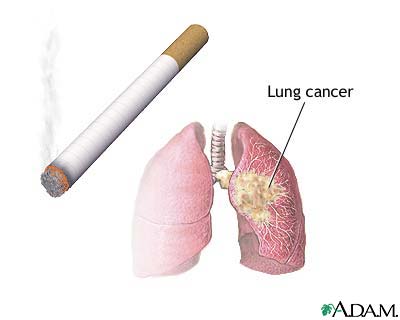 May 3, 2009 - Up to one half of current lung cancer occurrence could be attributable to cigarette design, according to David Burns and Christy Anderson of the University of California at San Diego School of Medicine. The study examined lung cancer rates as well as changes in the design and smoke composition of both American and Australian cigarettes over the last four decades. Both countries saw a rise in the use of low tar cigarettes, as well as the introduction of ventilated filters.
May 3, 2009 - Up to one half of current lung cancer occurrence could be attributable to cigarette design, according to David Burns and Christy Anderson of the University of California at San Diego School of Medicine. The study examined lung cancer rates as well as changes in the design and smoke composition of both American and Australian cigarettes over the last four decades. Both countries saw a rise in the use of low tar cigarettes, as well as the introduction of ventilated filters.
Decades ago, squamous cell carcinoma was the most common form of lung cancer. But between 1950 and 2007, adenocarcinoma became the most frequently diagnosed lung malignancy, as the market share of filtered cigarettes soared from just 1 percent to almost 100 percent. (Filtered Cigarettes Blamed for Huge Rise in Type of Lung Cancer Women's Health in the News, 9/6/2007) Women are more likely than men to develop a type of cancer called adenocarcinoma. The reason is not known, though adenocarcinoma is the most common lung cancer among nonsmokers, and women are less likely than men to smoke. (Lung Cancer Affects Sexes Differently by Denise Grady, The New York Times, 4/14/2004.)
The major known difference in cigarettes between the two countries is the level of tobacco-specific nitrosamines, a lung-specific carcinogen that causes adenocarcinoma--one of the four major cell types of lung cancer. Nitrosamines are found in far higher levels in American cigarettes than in Australian cigarettes, the study reports.
Poster Session: David Burns and Christy Anderson, University of California San Diego presented their results at the Joint Conference of the Society for Research in Nicotine and Tobacco (SRNT and SRNT-Europe), April 27-30, 2009, Dublin Ireland, TITLE: Is the Increase in Adenocarcinoma A Result of Changes in Cigarette Design, ABSTRACT..
David Sutton, a spokesperson for tobacco company PhilipMorrisUSA, said his company has been aware of concerns over nitrosamines for some time and has taken steps to reduce the levels of the carcinogen in tobacco. For instance, the company requires its tobacco growers to use indirect heating systems during the curing process to prevent the tobacco from being exposed to the combustion gases that increase the presence of nitrosamines. For growers that do not use a heat-based curing system, PhilipMorrisUSA requires the use of a tobacco seed that has been shown to produce less nitrosamines.
Poster Session Summary:
1) The study provides new evidence that among smokers there has been an increase in the risk of developing lung cancer, controlling for amount and duration of smoking, which has progressively increased in the US over the past four decades.
2) This increase in the risk of lung cancer among smokers coincides with a change in cigarette design over the past five decades.
3) This increase in risk of smoking over time is not evident for squamous cell carcinoma of the lung and is driven largely by changes in the risk of adenocarcinoma. The increase in adenocarcinoma as a proportion of all lung cancers is much less evident in Australia. This suggests that the difference may be caused by a difference in the cigarettes used in the two countries. One major known differences in cigarettes between the two countries is the lower levels of tobacco specific nitrosamines (a lung specific carcinogen for adenocarcinoma) in Australian cigarettes. The increased risk of adenocarcinoma in the US may be explained by the higher levels of tobacco specific nitrosamines in US cigarettes.
4) These observations strongly support the need for regulation of tobacco products, since technology exists to lower nitrosamines in tobacco.
Poster Session..
References: Are Cigarettes More Hazardous Than Ever? Risk of getting lung cancer has increased due to chnages in design, new study suggests by Stephanie Condon, CBS News, 4/30/2009; New Study Indicates Changes in Cigarette Design Have Increased Lung Cancer Risk and Tobacco Regulation Can Greatly Reduce Lung Cancer, redorbit.com, 5/1/2009.
Read more...
Swedish Match: Interim Report January - March 2009..
 May 3, 2009 - Scandinavian snus volumes grew considerably, aided by the fact that there was no destocking effect in Sweden in 2009 unlike the first quarter of 2008. In the US the increase of federal excise taxes (FET) effective April 1 affected trade buying patterns, with on the one hand trade loading of machine made as well as premium cigars, but on the other hand sharp destocking of snuff towards the end of the quarter. The result of this unusual stocking situation was a stronger than average performance for cigar sales and margins, and a weaker than normal performance for snuff sales and margins.
May 3, 2009 - Scandinavian snus volumes grew considerably, aided by the fact that there was no destocking effect in Sweden in 2009 unlike the first quarter of 2008. In the US the increase of federal excise taxes (FET) effective April 1 affected trade buying patterns, with on the one hand trade loading of machine made as well as premium cigars, but on the other hand sharp destocking of snuff towards the end of the quarter. The result of this unusual stocking situation was a stronger than average performance for cigar sales and margins, and a weaker than normal performance for snuff sales and margins.
Scandinavian snus sales were up 16 percent compared to the first quarter of the prior year while volumes measured in number of cans increased by 14 percent. Snus sales and can volumes in the first quarter of 2008 were unusually low as a result of destocking following excise tax and price increases in January 2008.
For cigars, sales increased by 56 percent during the first quarter. US cigar sales grew by 43 percent in dollar terms, with sales and volume growth for machine made cigars, and premium cigars positively impacted by hoarding activity in anticipation of FET related price increases. In Europe, sales declined somewhat in local currencies, while volumes increased. As a result of trade destocking related to the increased Federal Excise Tax (FET) as well as higher pipeline volume in the previous year for the Red Man moist snuff national rollout, volumes in the US declined by 5 percent.
Sweden is the world's largest snuff market measured by per capita consumption. A substantially larger proportion of the male population uses the Swedish type of moist snuff called snus compared to cigarettes. The US is the world's largest snuff market measured in number of cans and is approximately six times larger than the Swedish market.
As a result of trade destocking related to the increased Federal Excise Tax (FET) as well as higher pipeline volume in the previous year for the Red Man moist snuff national rollout, volumes in the US declined by 5 percent.
Reference: http://www.foxbusiness.com/story/markets/commodities/swedish-match-interim-report-january---march/, foxbusiness.com, 4/30/2009.
Read more...


To Provide Public Awareness
Purpose
About Us
Contact Us
2008 HIGHLIGHTS
TOPIX PAPERS - 2008 & 2009..
Archive
-
▼
2009 (1446)
-
▼
05/03 - 05/10 (29)
- In Process - Anti-tobacco industry ads successful ...
- In Process - Household passive smoking and risk o...
- Mississippi will have a 50-cent increase in tax on...
- England, House of Lords votes to ban shop tobacco ...
- Imperial Canada - stop illegal tobacco sales rath...
- Wisconsin may be the 26th state to ban smoking in...
- PMI - 2009 Annual Meeting of Stockholders, May 5, ...
- Philip Morris USA sues over counterfeit Marlboros..
- Israel - first menthol-cigarette lawsuit in the wo...
- Mississippi governor wants more tobacco taxes con...
- North Carolina - smoking ban scaled back again..
- India - pictorial warning on cigarettes and tobacc...
- Senator Kennedy introduces legislation for FDA to ...
- EU - restrict imports of tobacco unless member ha...
- Oregon - cigarette butt law passed in State House..
- Maine - law banning flavored tobacco products - Ju...
- Smoking rates decline in New York City..
- Croatia begins enforcing smoking ban on May 6, 2009..
- Kenya - smoking ban must be enforced - it's the law..
- Jordan - restaurant owners want smoking ban postpo...
- China - smoke more to kick-start the economy..
- Turkey - data on tobacco usage - Turkish Statistic...
- Denmark - possible graphic warnings on cigarette p...
- Indonesia 'cash cow' for Philip Morris Internation...
- SC tobacco tax increase - doubt exists maybe NOT t...
- C-store update, Pall Mall/Maverick, more SNUS ima...
- Bulgarian tobacco company Sofia-BT exports increa...
- Increased Adenocarcinoma Type Lung Cancer - Cigare...
- Swedish Match: Interim Report January - March 2009..
-
▼
05/03 - 05/10 (29)